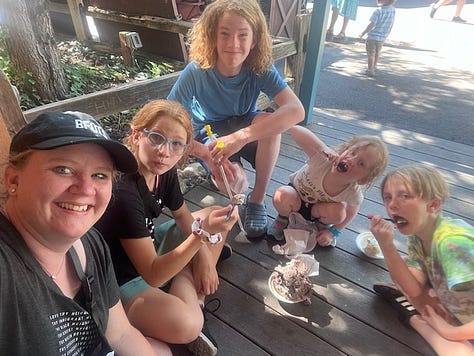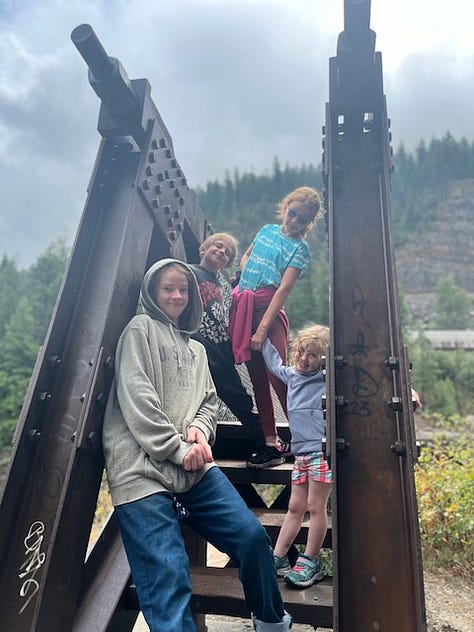
On the first day of school, three of my children will be middle school age. Given that they attend a rural K-8, the line between elementary and middle school is somewhat fuzzy. However, there will be no one in the elementary wing of the school. They will have band and P.E. every day instead of multiple recesses. There will be electives and a full roster of sports. Carsten will be in 5th grade, so he will not have to bounce between as many teachers as the others, but he will still have a different experience from K-4. Saoirse is a 6th grader eager to try out student council and other classroom politics. As a born hype girl, extravert to the core, and one-woman welcome committee, I imagine she will keep a busy calendar. Ethan is heading into 8th grade, with plans to continue playing the flute and learning as much advanced math as the teacher will let him.
So, I thought it would be a good opportunity to share some things I have learned about this stage of parenting.
Drama is not gendered. There are a lot of cultural assumptions about drama, such as it is the domain of the female (drama queen). As a mother of two boys and two girls, I have learned that drama is a human thing. The biggest factor in drama is not gender but personality. Does the person in question process externally or internally? Two of my children express excitement with shrieks, squeals, and physical jubilation. They are also more likely to express hurt and anger with outbursts of tears or yelling. Spoiler alert: one is a boy, and one is a girl. The other two take more coaxing (and yes, one is three and therefore has plenty of emotional outbursts, but not nearly as much as her sister did at the same age).
Emotions need an outlet. Especially for children who are internal processors, since they do not naturally express their feelings, they need to learn ways of doing so. This prevents the pressure cooker situation when you stuff all the feelings down until an explosion occurs (as an internal processor myself, I recognize the signs of this). Giving everyone space and skills to vent frustrations and share joy is essential.
Meanness is a roller coaster. Since I was homeschooled, the social dynamics of middle school are incredibly confusing and unfamiliar to me. All I have was my relationships with my sisters to go off of, and that is more about sibling rivalry. If I went based on movies, I would assume that the mean people are always mean. Sometimes that is true, but sometimes kids are mean one day and BFFs the next. What goes up must come down, and I have trouble keeping up most days. I am naturally cautious when it comes to relationships, and I have to work hard not to hold a mother's grudge against a child who hurt my child. If my child can forgive and move on, that is good. I watch for the patterns and then try to encourage my children towards some people and away from others. A pattern of meanness is not a person with whom to form close friendships.
Some battles are for parents to fight (usually when they involve physical harm, cyberbullying, and other adults), while others are for the kids to fight. This one is so hard because when my child comes to me with a grievance, I want to make it better. However, this is the age they need to start cleaning up their messes and making mistakes that have fewer long-term consequences. I am their safety net as they navigate walking a high wire.
Saying “I don’t know” is an acceptable response. This is true for me and the kids. Adults don’t know everything, usually we just know a lot more than kids. This is when we can learn together and I can show by example how to do that. Just the other day, my oldest son and I were playing Wordle together; the word of the day was one I had never heard of (chert: a geological word for a specific type of rock). I told him I did not know what it meant, so we went, looked it up, and learned something together. By taking these steps, I teach them to trust me, that if I don’t know, I will look for the answer. Therefore if I do know, I had to look for the answer at another point in my life.
Give people the benefit of the doubt—this piggybacks on the meanness thing. We all have bad days, and misery loves company, so people can be mean in the moment. Also, most people are not thinking about us nearly as much as we believe they are thinking about us.
You don’t have to get involved in other people’s beef. Two of my children hate it when their friends conflict. While this compassion is commendable, they often try to act as the middleman, and that pretty much backfires every time. Right now, I advise them to stay out of it; it’s better to direct them to the teacher/school counselor/their parents.
You can do things to make a hard day better (e.g., drink water, cry, shower, sleep, and eat some food). We can get down to business once you have done all of those things. Almost every situation my children have come to me with has been improved by one of the above-listed actions. Honestly, I could do better by taking my advice in that regard. When you care for your body's needs, you can sort through the emotions you feel.
Late-night conversations are great but should sometimes be halted to prevent spiraling. My brain does not function well at night, yet this is inevitably when someone needs to come and tell me what they are struggling with. Sometimes, just the act of verbalizing it to me is enough. Other times, it just keeps spiraling into anxiety, and no solutions are apparent. When I recognize that is what is happening, I send them to bed as gently as I can with the promise of returning to the conversation the next day.
I hope these lessons will take me through the brunt of middle and high school drama, but I am sure there is so much more to learn on my parenting journey. When I feel overwhelmed by all the emotions of the stage, I remember that I taught them all to use the toilet, get dressed, ride a bike, and so many other sundry acts of being human. When other adults in their life complement their compassion and intelligence, I can remember how much work I have already done to help them become so. I cannot prevent pain and suffering in their lives, but I can support them with love and teach resilience as they grow.



For the Ears
Sometimes, we all need to sing along to this song and make fun of ourselves.
For the Eyes
The internet has a lot of parenting advice, and it is not all going to be applicable to you. But with a little time and a lot of boundaries I have found the parenting gurus that are most helpful to me.
Mary Vangeffen of Spicy One
Jennifer Anderson of Kids Eat in Color
Meredith Miller of Kids + Faith
I also consume enough TikTok to keep me on the pulse of Gen Alpha slang. “Gyat” means your butt. “Ohio” means loser. “Hitting the griddy” is a dance from Fortnite.
Although I sort of understand the lingo, using is the worst thing I could possibly to do, as the embarrassment will send them to their social graves. Even if I do it in the car when no one else is around.
Do any other parents love to annoy their kids this way? :)
For the Taste Buds
As usual, I have discovered something about food I dislike. In this case strawberry ice cream, which I have regarded as not for me. Until I made a homemade version. Which was delicious. Turns out I am just picky about the quality presented to me. Sometimes that kind of snobbery does save me from eating a lot of unnecessary sugar though. What food are you super picky about in terms of quality?
May this week this week bring faithfulness to your senses and your soul.



Very wise counsel. I could have used this when my kids were in middle school and imagine one day I will be applying it with my grandchildren.
Every parent of elementary, middle school, highschool, and college student should print this out and tack it to their wall. So wise!
I had to laugh about the slang. Just yesterday our pastor mentioned that even if you know the slang, don't use it. LOL I don't know the slang but I did hear 'Ohio' used the other day and wondered, "what on earth"? Great article, Caitlin.